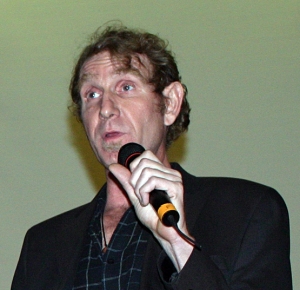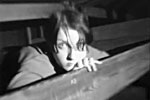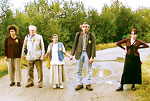Doniphan Blair began "Our Holocaust Vacation" as a research project in the late 1980s and went on to scout the project, write its shooting script, including the performance pieces, do some camera and editorial work, and compose half the music.
Born in 1954, Doniphan was painting and making films by the time he got to high school. He spent much of his twenties backpacking around the United States, Asia and South America, often stopping to live with locals or work on projects. Notable among the latter was founding an artist’s commune in San Francisco (1975), joining a theatre collective in Peru (1980) and in 1980 making a short feature film in Brazil with renown Brazilian photographer Mario Cravo Neto. He studied film at the San Francisco Art Institute, graduating in 1990.
In the course of his adventures, Doniphan developed an interest in the “difficult idea.” Originally focusing on mysticism and tribal societies, he soon graduated to the Holocaust. Despite his mother’s quiescence on her experience, he realized that her suffering triggered intense feelings and anger.
He devoted a decade to researching it, reading extensively, studying at the Holocaust Center of N. California and New York’s YIVO Institute, attending conferences and classes, interviewing his mother and other survivors and writing an article, Bruno Lowenberg: A Holocaust Survivor, which won a North-West Journalism Award (1984). He also continued publishing on other subjects like Tobias Schneebaum: Becoming the Wild Man (1985), Drug War Delusions (1991), The Evolution of Capitalism and Advertising (1994) and various articles on film/video (2006-onoging).
One of Doniphan's initial insights into the Holocaust was that the camps were not ruled solely by natural selection, or “survival of the fittest,” as the Nazis intended. It was his mother’s story of an innocent young woman working as a nurse, not fighting for every scrap and depending on friends that compelled him to conclude that “sexual selection,” Darwin’s second theory governing reproduction, played a critical role.
Doniphan’s focus remained on film and video: studying for his degree, working on commercial productions (sometimes with his father, a lighting cinematographer) and producing his own pieces. He completed various dramatic, documentary and non-narrative shorts: Cancer in the Tropics, 1986 (32 min, 16mm, shot in Brazil and shown at various Latin American festivals), Job, 1988 (20 min video, winner of an award from the 1989 SF International Film Festival), Home Movie, 1990 (20 min, 16 mm, drama) and Talk No Show, 1991 (24 min doc on phone sex workers bought by the San Francisco Human Sexuality Institute). He also collaborated his brother, Nicholas, on America’s Culture of Crash, 1996, a documentary about demolition derby.
With the birth of his daughter, Irena, who went on to star in "Our Holocaust Vacation," Doniphan embarked on a graphic design career while continuing film, video and writing. He started A Media, his own studio, in tandem with his brother’s video production, a sister studio in New York. Over the years, he has created a wide variety of graphics, branding, cartoons, photography and copy for nonprofits and entrepreneurs alike: from city-wide AIDS prevention and recycling campaigns to architectural banners for Oakland’s African American Museum or the film/video magazine, CineSource.
He still keeps his big ideas folder full: a Multicultural Institute for Oakland, essays on Darwinism and Religion or The History of Sufism and various film projects. He and his brother are currently working on their next documentary, "Heaven and Hell," about a commune, and "The Women’s Side of War," themes which are addressed in "Our Holocaust Vacation." He currently resides in Oakland, California.


